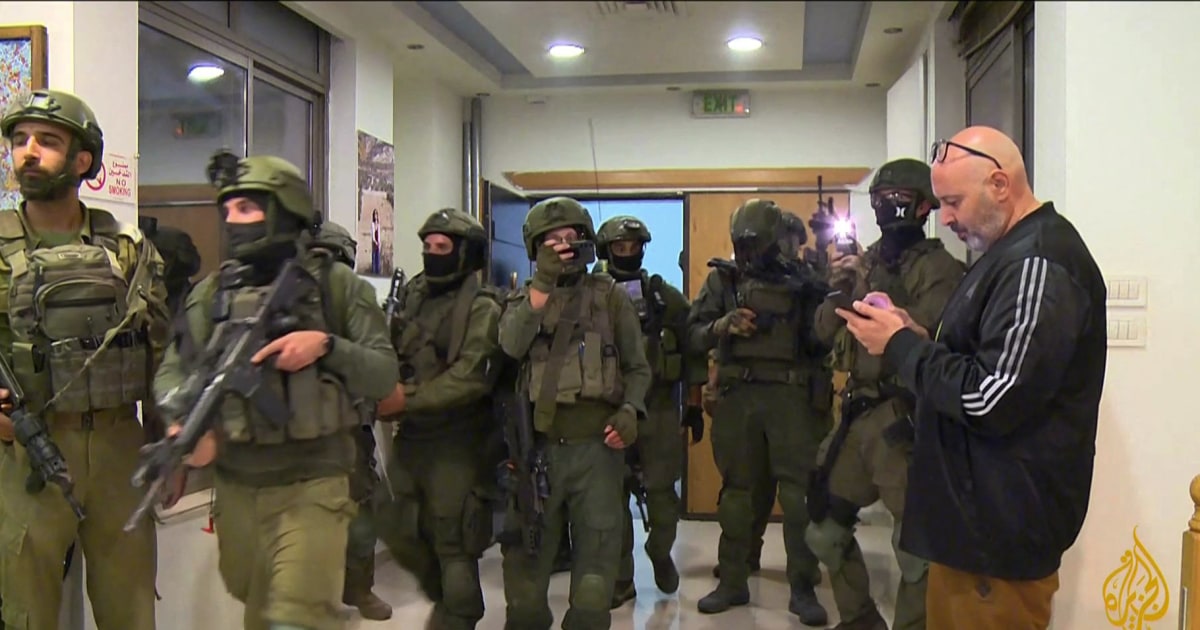World
Opinion | Israel bombed my home as a result of my journalism. This can’t become our new normal.

On Sept. 22, Israeli forces stormed Al Jazeera’s Ramallah office and shut down its operations, effectively barring one of the few remaining windows into the realities of life under occupation in the West Bank. The incident, as alarming as it is, extends far beyond the closure of a newsroom and marks an escalation in Israel’s broader crackdown on press freedoms in Palestine. For those of us journalists who have reported from the ground, our work has never been just about reporting the news; it’s about making visible to the world a reality that shapes every aspect of our daily lives as Palestinians.
As a writer and reporter for Al Jazeera in Gaza during the war from October 2023 until last May, I experienced firsthand the dangers of reporting on the ground.
This isn’t the first time Israel has taken aim at media workers in Palestine, where it attempts to control the narrative in tandem with efforts to control territory. We’ve seen similar tactics since October of last year, and long before, when tens of Palestinian journalists were killed along with their family members, media offices bombed, and entire news organizations targeted. I’ve lost colleagues who reported side by side with me from northern Gaza, like Ismail Al Ghoul. Together Ismail and I endured months of cold and hunger, and terrifying nights during Israel’s ground offensives. He and so many other dedicated colleagues were killed for speaking out, for doing their job.
I know this because I survived it. As a writer and reporter for Al Jazeera in Gaza during the war from October 2023 until last May, I experienced firsthand the dangers of reporting on the ground, and the scrutiny I was subjected to for being affiliated with Al Jazeera. The press badge on my chest, meant to ensure my safety, functioned as a target. In December 2023, my home was bombed with me and my family inside, as a direct result of my work, after I received multiple threats via phone calls and text messages from the Israeli military ordering me to stop reporting and cease writing.
My own experience in Gaza bears this out. The bombing of my home didn’t just shake my personal life by burying me under the rubble for hours — it disrupted my sense of purpose as a writer and journalist. For days, I questioned whether I could continue reporting. Knowing the cost, my family lived in constant fear every time I went on assignment, while colleagues around me grew increasingly afraid to speak out, knowing that anyone could be a target at any moment.
What we witnessed daily, from drone surveillance and press tents being bombed to the direct shooting at journalists and targeting of their vehicles as they traveled for coverage, was not just an attack on the ones trying to report, but on the very idea of journalism. It is an attack on the notion that the world has a right to know what happens in places like Gaza and the West Bank. Still, we continued to report because we knew the world needed to see what was happening, and we knew that to stop reporting would mean to surrender to the very forces that sought to silence us.
Al Jazeera has been a crucial voice documenting not only the devastation in Gaza, especially as it produces exclusive access and footage to its viewers from the ground, but also the civil unrest and protests within Israel, the political discontent in Tel Aviv, and the deadly raids on refugee camps in the West Bank. Now, with its Ramallah bureau shut down, that voice is fraying. But this is only one episode in Israel’s ongoing campaign against the media in the occupied territories.
This is only one episode in Israel’s ongoing campaign against the media in the occupied territories.
What’s striking is that it comes nearly one year into Israel’s war on Gaza, dimming any hope of renewed global attention as people near an anniversary of death and destruction. What concerns me most is that this is more than just about Al Jazeera. It’s about the future of a young generation of journalists aspiring to speak out during times of terror and oppression. As someone who reported from right in front of Israeli tanks, I can say that journalists in Palestine are heartbreakingly treated as a threat.
Israel’s efforts to silence the free press represent a tragedy that cuts deep into the ongoing struggle for liberation and peace. It’s a tragedy for anyone who values the role of the press in democratic societies. When journalists are attacked, the public is denied the information necessary to truly understand reality.
When the press is silenced, it’s not just a building that closes or stories that disappear. It’s accountability itself that is lost. It cuts off a vital flow of information to the public. And the consequences ripple far beyond the journalists themselves. The world loses access to the ground truth — the kind of truth that challenges “official” government narratives, the kind that holds the powerful to account.
By attacking journalists, whether through the bombing of their homes, as in my case, or shutting down newsrooms, as we saw in Ramallah, Israel is sending a chilling message: Telling the truth is dangerous work with a steep price.
That’s why the closure of the Ramallah office isn’t merely an Al Jazeera or local concern — it’s a global one. The erosion of press freedoms in Palestine reflects a disturbing trend, a concerted effort to undermine the institutions that safeguard truth and transparency. It’s a pattern of slow, deliberate attempts to dismantle the free press entirely. Because if we allow press freedoms to be eroded in Palestine, what’s to stop it from happening elsewhere?
In this critical moment, the world can’t afford to look away. In defending journalism, we defend the truth. It’s the means by which we fight against injustice. I know what happens when the press is attacked, and I fear we’ve reached a point where these attacks have become the norm, accepted even. The closure of the Ramallah office is an upsetting move, yes. But it’s also an urgent call to action, because it won’t stop with Al Jazeera.





/cdn.vox-cdn.com/uploads/chorus_asset/file/25817959/2025_LG_OLED_evo_M5_PR_Image.jpg)



